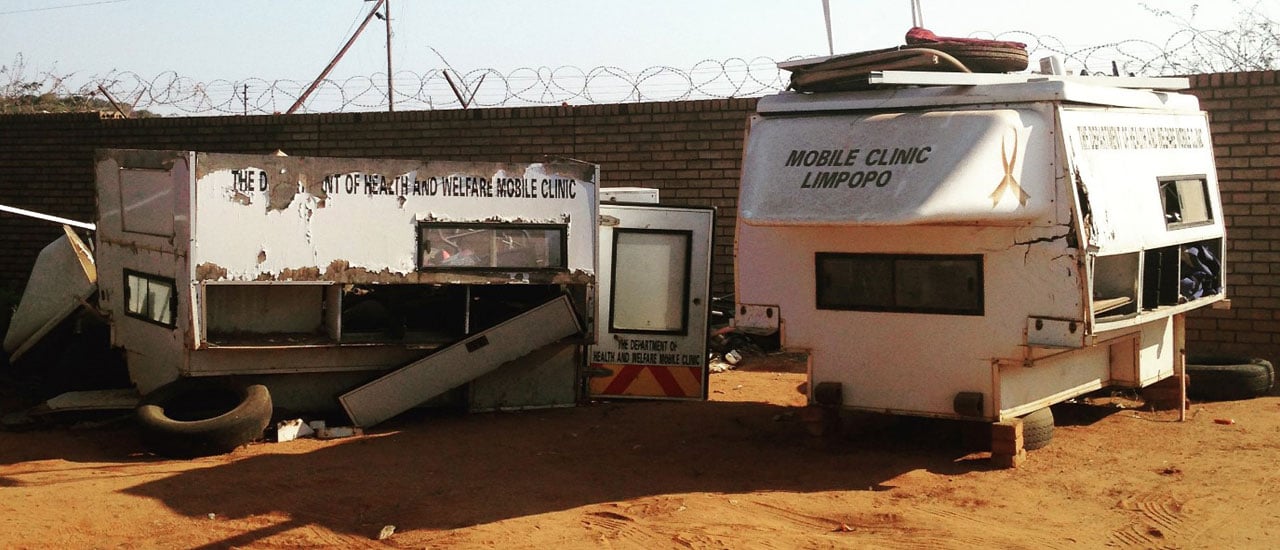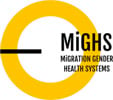
Credits: Jo Vearey (Co-Investigator, MiGHS)
Migration Gender Health Systems (MiGHS)
A research collaboration addressing pressing issues facing health systems globally and at a national level in South Africa – the impacts of and response to migration and its intersection with gender.
The MiGHS project has been designed to inform policies and build capacity amongst researchers, policymakers and implementers, to make health systems more responsive to the intersection between gender and migration in South Africa and globally.
MiGHS collaborating partners include, researchers at the LSHTM, the African Centre for Migration and Society (ACMS) at the University of the Witwatersrand (Wits), the University of Cape Town (UCT) and the South African Department of Health (DoH).
This research is funded through the Health Systems Research Initiative (HSRI) in the UK, a collaboration of UK MRC, ERSC, DFID, and the Wellcome Trust. Grant number: MR/S013601/1.
- Grant title: Migration, gender and health system responses in South Africa: A focus on the movement of healthcare users and workers
- Grant duration: January 2019 – January 2022 (36 months)
Recent updates
At the beginning of March 2020, investigators and study staff decided not to proceed with the planned enrolment into the WhatsApp Study, which forms a core part of field work and data collecti
Events
Newsletter
Contact us
Johanna Hanefeld, Associate Professor, Faculty of Public Health and Policy, London School of Hygiene and Tropical Medicine
Jo Vearey, Associate Professor and Director, African Centre for Migration and Society (ACMS) at the University of Witwatersrand (Wits)
MiGHS is a research collaboration between researchers at the London School of Hygiene and Tropical Medicine (LSHTM), the African Centre for Migration & Society (ACMS) at the University of the Witwatersrand (Wits), the University of Cape Town (UCT) and the South African Department of Health (DoH).
It has been developed to address one of the most pressing issues facing health systems globally and at a national level in South Africa – the impacts of and response to migration and its intersection with gender.
MiGHS responds specifically to needs identified through exploratory research undertaken by the investigators in South Africa. The project has been designed to directly inform policies and build capacity amongst researchers, policymakers and implementers, to make health systems more responsive to the intersection between gender and migration in South Africa and globally. It will do so by generating new knowledge and a series of innovative impact activities.
Recent updates
At the beginning of March 2020, investigators and study staff decided not to proceed with the planned enrolment into the WhatsApp Study, which forms a core part of field work and data collecti
Events
Newsletter
Contact us
Johanna Hanefeld, Associate Professor, Faculty of Public Health and Policy, London School of Hygiene and Tropical Medicine
Jo Vearey, Associate Professor and Director, African Centre for Migration and Society (ACMS) at the University of Witwatersrand (Wits)
This project will examine how migration and population mobility affect the South African health system, and how the health system responds and adapts as a result of migration and population mobility. The research explicitly explores gender and the role of gender in shaping the above interactions. It uses an intersectionality lens to understand the complex interaction between migration, gender and health systems. The project addresses key gaps in evidence and knowledge on patient migration and mobility and their impacts on health systems globally and in South Africa. Each of the following research objectives addresses an important gap in the evidence to address the research aim:
- To assess levels of migration by patients and health workers within, into and out of South Africa;
- To examine the health care experiences of both migrant and non-migrant patients and health workers;
- To analyse how the South African system adapts and responds in light of the population movement identified in Objective 1;
- To examine how the experience and responses garnered from Objectives 1-2 are shaped by gender.
Recent updates
At the beginning of March 2020, investigators and study staff decided not to proceed with the planned enrolment into the WhatsApp Study, which forms a core part of field work and data collecti
Events
Newsletter
Contact us
Johanna Hanefeld, Associate Professor, Faculty of Public Health and Policy, London School of Hygiene and Tropical Medicine
Jo Vearey, Associate Professor and Director, African Centre for Migration and Society (ACMS) at the University of Witwatersrand (Wits)
Professor Catherine (Sassy) Molyneux
Co-Investigator
Sassy Molyneux is a Professor of Global Health, employed by Oxford University, UK, based at the Kenya Medical Research Institute-Wellcome Trust Research Programme in Kilifi, Kenya. She is a behavioural scientist, with a background in human geography. Her current main research interests include health system finance and governance, household treatment-seeking behaviour and affordability of health care, responsiveness of health systems to user and population priorities and concerns, and research ethics. Professor Molyneux also supports strategic planning around ethical issues that emerge during research across the KEMRI-Wellcome Trust programme in Kenya, and contributes to social science, health systems research and research ethics training at the centre and internationally.
Dr Helen Walls
Co-Investigator
Dr Walls is an Associate Professor in the Department of Global Health and Development at the London School of Hygiene and Tropical Medicine. She is a public health researcher interested in understanding the impact of and addressing through governance and policy the structural determinants of population health. Her research has covered several key areas of global health, including trade in health services, and migration and health system responses. She is a Research Associate of the University of the Witwatersrand, and an Honorary Senior Fellow of the University of Melbourne.
Dr Jill Olivier
Co-Investigator
Dr Olivier is an Associate Professor in Health Policy and Systems at the University of Cape Town (UCT). She has experience as a researcher and research manager in countries across Africa, the Asia-Pacific region and the Americas – holding a South African National Research Foundation B-rating. She is currently the Principal Investigator of several large multi-country grants, including a grant from the WHO (on non-state providers in Ghana), and another from the UK MRC (on health system responsiveness in South Africa and Kenya). Her current work focuses on topics such as non-profit non-state health providers; intersectionality; health systems resilience and responsiveness; community system strengthening; health system histories; and communication and cultures within health systems.
Dr Joanna Vearey
Co-Investigator
Dr Vearey is an Associate Professor and Director of the African Centre for Migration & Society (ACMS), University of the Witwatersrand, where she is involved in designing and coordinating research programmes, teaching, and supervising graduate students. She is Director of the African Research Universities Alliance (ARUA) Centre of Excellence in Migration and Mobility which is hosted by the ACMS. Dr Vearey is involved in multiple international partnerships, is Vice-Chair of the global Migration, Health, and Development Research Initiative (MHADRI), and is an Honorary Researcher at the School of Social and Political Sciences, University of Edinburgh. She is a South African National Research Foundation rated researcher and, supported by a Wellcome Trust Investigator Award, established the Migration and Health Project Southern Africa (maHp).
Dr Johanna Hanefeld
Principal Investigator
Dr Hanefeld is an Associate Professor in Health Policy and Systems and lead of the LSHTM office in Berlin. Her work focuses on the political economy of global health. Dr Hanefeld’s current research is on health systems, including resilience and quality, and on the impact of medical travel and migration. It includes policy analysis on antimicrobial resistance (AMR) in Pakistan and Cambodia, work on trade and health including with the WTO, on governance and health inequalities. Actor power and network analysis are central themes across this programme of work. All Dr Hanefeld’s research is empirical and most of it has been situated in low- and middle-income countries. She also has an active interest in the development of policy analysis methods.
Professor Lucy Gilson
Co-Investigator
Lucy Gilson is a Professor in Health Policy and Systems with a joint appointment at the LSHTM/University of Cape Town (UCT). Her research broadly focusses on how to strengthen health systems to offer better public value, with particular concern for health equity. She has a track record of research around: health policy implementation; decentralisation, district health systems and primary health care; user fees and financing issues; and leadership and management. As she has a particular interest in understanding health system actors’ decision-making, Professor Gilson’s work also considers how trust and power relations shape health system dynamics and complexity. She is also involved in a wider range of capacity development activities within the field of Health Policy and Systems Research.
Dr Moeketsi Modisenyane
Co-Investigator
Dr Modisenyane is a Health Policy and Systems researcher. He also holds the position of Director: International Health Development and Support at the National Department of Health, South Africa where he is involved in providing overall technical leadership in global health programming, with a special focus on strengthening health and social systems in the public sector. In addition, he is involved in designing, implementing, monitoring, and evaluating regional health and development projects mainly in Southern Africa, including mobilising resources for national and regional projects.
Professor Richard Smith
Co-Investigator
Richard Smith is Professor of Health Economics and also Deputy Pro-Vice Chancellor at the University of Exeter College of Medicine and Health, joining in 2018 after 10 years at the LSHTM where he was Dean of Faculty of Public Health and Policy. His work spans micro-economics (e.g. econometric analysis of large data, and behavioural economics involving experiments), but also pioneering the application of macro-economic modelling to health issues. He has been involved in work on trade and health, especially health services, for some 15 years, including co-editing a major series in The Lancet in 2009.
Dr Karima Manji
Researcher
Dr Manji is a Research Assistant in the Department of Global Health and Development at the LSHTM. She is a guest lecturer on domestic violence at the Charité University in Berlin, where she also supervises Masters students in International Health. Her PhD from the LSHTM applied social norms theory to explore how gender norms sustain intimate partner violence in Tanzania. She has worked as a research consultant for Save the Children UK, the Gender, Violence and Health Centre (GVHC) of the LSHTM, the Medical Research Council (MRC) UK, and the Department for International Development (DFID), on applying social norms theory to advance social justice issues.
Dr Langelihle Mlotshwa
Researcher
Dr Mlotshwa is a post-doctoral researcher at the African Centre for Migration and Society (ACMS), University of the Witwatersrand. She completed her doctoral studies at the University of Basel (Switzerland); her work focused on sexual practices of both men and women, social norms surrounding these practices, and reasons for risk-taking during pregnancy, as a way to understand and overcome incident HIV and barriers caused by gender inequality and other matters. For a decade she has researched public health matters in rural and urban South Africa. Her interests include sexual and reproductive health, migration, gender, HIV/AIDS, maternal health and understanding the dynamics of the changing family, and how this impacts on HIV/AIDS in poor resource settings.
Dr Thea de Gruchy
Researcher
Thea de Gruchy is a post-doctoral researcher at the African Centre for Migration and Society (ACMS), University of the Witwatersrand. She has been researching and writing about migration and health since 2015. Her PhD uses the development and implementation of policy and programmatic interventions - by both state and humanitarian actors - to improve the access that migrant farm workers have to health care along the South African-Zimbabwean border, to explore questions of governance, decision making, and sustainability.
Shehani Perera
Researcher
Shehani Perera is a Doctoral Candidate and Junior Research Fellow at the School of Public Health and Family Medicine, University of Cape Town. Her Masters research explored how sexual health is influenced by religious beliefs and contemporary youth culture among young women living in a context of socio-economic deprivation and marginalisation. She has worked as a Research Assistant on a number of projects that have looked at digital health tools for frontline health workers, linkage to HIV-care and access to and quality of diabetes care. Her interests include cultural and religious influences on health care and health systems; mental health; HIV; gender; and the intersection between social work and public health systems.
Recent updates
At the beginning of March 2020, investigators and study staff decided not to proceed with the planned enrolment into the WhatsApp Study, which forms a core part of field work and data collecti
Events
Newsletter
Contact us
Johanna Hanefeld, Associate Professor, Faculty of Public Health and Policy, London School of Hygiene and Tropical Medicine
Jo Vearey, Associate Professor and Director, African Centre for Migration and Society (ACMS) at the University of Witwatersrand (Wits)
Recent updates
At the beginning of March 2020, investigators and study staff decided not to proceed with the planned enrolment into the WhatsApp Study, which forms a core part of field work and data collecti
Events
Newsletter
Contact us
Johanna Hanefeld, Associate Professor, Faculty of Public Health and Policy, London School of Hygiene and Tropical Medicine
Jo Vearey, Associate Professor and Director, African Centre for Migration and Society (ACMS) at the University of Witwatersrand (Wits)
Recent updates
At the beginning of March 2020, investigators and study staff decided not to proceed with the planned enrolment into the WhatsApp Study, which forms a core part of field work and data collecti
Events
Newsletter
Contact us
Johanna Hanefeld, Associate Professor, Faculty of Public Health and Policy, London School of Hygiene and Tropical Medicine
Jo Vearey, Associate Professor and Director, African Centre for Migration and Society (ACMS) at the University of Witwatersrand (Wits)
At the beginning of March 2020, investigators and study staff decided not to proceed with the planned enrolment into the WhatsApp Study, which forms a core part of field work and data collection for the grant, as COVID19 led to an unprecedented global lockdown.
In light of the need to halt the primary data collection, investigators and study staff discussed how to continue work in a meaningful way. Here, two areas of immediate work emerged as feasible and important to ensure continuation of work. The work set out here below is envisaged for a six month period from April – October 2020:
- Framing analysis of policy documents at the global, regional and national levels, and sub-national level in South Africa, to inform the policy analysis as part of Objective 2 and 3 of the MiGHs grant, and result in an independent analysis of how migration and mobility is perceived as an issue in these primary documents. For example, whether it is seen as a problem or an opportunity, whether there is focus on health workers or patients, whether migration is seen in relation to urbanisation or employment.
- Framing analysis of media coverage of COVID19 in Southern Africa and the way in which migration is viewed within this, and how it develops over time.
- To ensure coherence across these two activities, the following objectives are intended to cover both sets of activities. They intend to:
- Understand the ways in which mobility and migration are framed in primary policy documents relating to health and migration at global, regional, national and sub-national levels. To understand:
- a) to what extent this is phrased as a challenge or an opportunity
- b) how rising levels of mobility are conceptualised within policy and to finally understand
- c) how this might inform specific approaches or the preference of certain policy options over others.
- Such analysis will enable the ascertainment of both coherence and incoherence across different levels of policymaking within global health and at national and sub-national levels in South Africa. It also aides the analysis and understanding of how the issue is viewed, how its perception changes over time and the political economy underlying it.
Similar focus on analysis of how migration and mobility is represented in media coverage of COVID19 in the Southern African media will equally help understand how migration and mobility are perceived as part of the current outbreak of COVID19.
Such analysis is of great importance as migration and mobility have been closely linked to the spread of the disease, while at the same time, mobile populations and migrants are amongst the groups facing great challenges as a result of both the disease and the measures taken to address it.
Welcome to the new Migration Gender Health Systems website
Recent updates
At the beginning of March 2020, investigators and study staff decided not to proceed with the planned enrolment into the WhatsApp Study, which forms a core part of field work and data collecti
Events
Newsletter
Contact us
Johanna Hanefeld, Associate Professor, Faculty of Public Health and Policy, London School of Hygiene and Tropical Medicine
Jo Vearey, Associate Professor and Director, African Centre for Migration and Society (ACMS) at the University of Witwatersrand (Wits)




